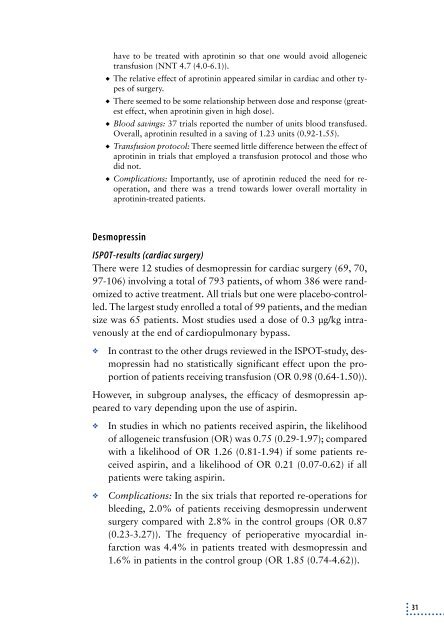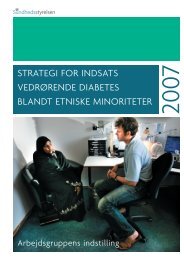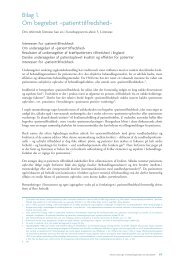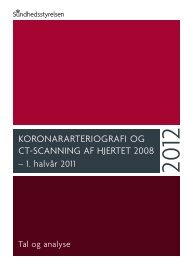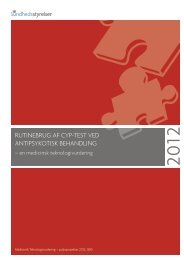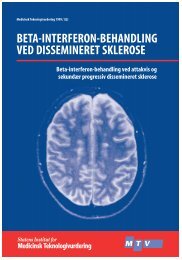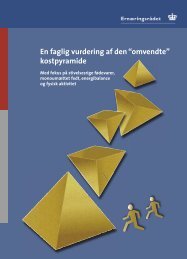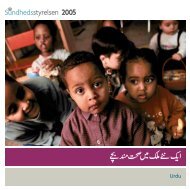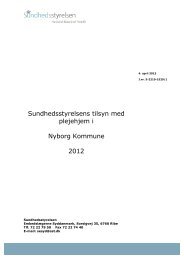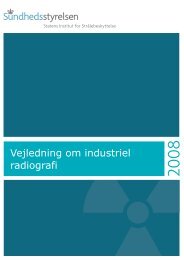Elektronisk udgave - Sundhedsstyrelsen
Elektronisk udgave - Sundhedsstyrelsen
Elektronisk udgave - Sundhedsstyrelsen
Create successful ePaper yourself
Turn your PDF publications into a flip-book with our unique Google optimized e-Paper software.
have to be treated with aprotinin so that one would avoid allogeneic<br />
transfusion (NNT 4.7 (4.0-6.1)).<br />
◆ The relative effect of aprotinin appeared similar in cardiac and other types<br />
of surgery.<br />
◆ There seemed to be some relationship between dose and response (greatest<br />
effect, when aprotinin given in high dose).<br />
◆ Blood savings: 37 trials reported the number of units blood transfused.<br />
Overall, aprotinin resulted in a saving of 1.23 units (0.92-1.55).<br />
◆ Transfusion protocol: There seemed little difference between the effect of<br />
aprotinin in trials that employed a transfusion protocol and those who<br />
did not.<br />
◆ Complications: Importantly, use of aprotinin reduced the need for reoperation,<br />
and there was a trend towards lower overall mortality in<br />
aprotinin-treated patients.<br />
Desmopressin<br />
ISPOT-results (cardiac surgery)<br />
There were 12 studies of desmopressin for cardiac surgery (69, 70,<br />
97-106) involving a total of 793 patients, of whom 386 were randomized<br />
to active treatment. All trials but one were placebo-controlled.<br />
The largest study enrolled a total of 99 patients, and the median<br />
size was 65 patients. Most studies used a dose of 0.3 µg/kg intravenously<br />
at the end of cardiopulmonary bypass.<br />
❖ In contrast to the other drugs reviewed in the ISPOT-study, desmopressin<br />
had no statistically significant effect upon the proportion<br />
of patients receiving transfusion (OR 0.98 (0.64-1.50)).<br />
However, in subgroup analyses, the efficacy of desmopressin appeared<br />
to vary depending upon the use of aspirin.<br />
❖ In studies in which no patients received aspirin, the likelihood<br />
of allogeneic transfusion (OR) was 0.75 (0.29-1.97); compared<br />
with a likelihood of OR 1.26 (0.81-1.94) if some patients received<br />
aspirin, and a likelihood of OR 0.21 (0.07-0.62) if all<br />
patients were taking aspirin.<br />
❖ Complications: In the six trials that reported re-operations for<br />
bleeding, 2.0% of patients receiving desmopressin underwent<br />
surgery compared with 2.8% in the control groups (OR 0.87<br />
(0.23-3.27)). The frequency of perioperative myocardial infarction<br />
was 4.4% in patients treated with desmopressin and<br />
1.6% in patients in the control group (OR 1.85 (0.74-4.62)).<br />
31


